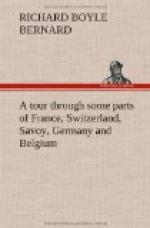The country, for many leagues round Calais reminded me very strongly of Cambridgeshire in its general appearance, being flat, well cultivated, unenclosed, and abounding in wind-mills. About the villages there are some trees and enclosures; but a few more church spires are wanting to complete the resemblance. The distance from Calais to Paris is about 180 English miles, and may generally be considered as a flat country, occasionally diversified by a few hills of no great magnitude. Enclosures are rarely seen, but the quantity of corn is quite astonishing. Agriculture appeared to me to be in a highly improved state: there are artificial grasses and meliorating crops. The appearance of the villages in general on this road is but little inferior to those in many parts of England. But the peasants, although not for the most part badly off, have no idea of that neatness, and of those domestic comforts which form the great characteristic of the same class of people in England.
An English farmer would laugh at the great cocked hat which is usually worn by the French husbandman, and would not be disposed to change his white frock for the blue one used on the Continent. Some wood is occasionally to be seen; but Picardy is not famous either for the quantity or quality of its timber. The general fuel of the lower orders is turf, which, however, is not in any great quantity; and in appearance it is inferior to that used by the Irish peasants. The roads are in general kept in good repair, and near Paris and some other great towns they are paved in the centre. They are flanked in many places by avenues of trees, which are for the most part cut with great formality; but even where left to themselves, they do not add much to the ornament of the country or to the comfort of the traveller, affording but a scanty shade.
The whole of this road is without turnpikes; they were, as I understood, abolished about three years ago, and the roads are now managed by the government. The French praise Buonaparte extremely for his attention to the state of their roads, and it must be owned that in this particular he merits the praise bestowed on him, which cannot be said with truth of many other parts of his conduct which seem to have been also approved of by the French. Buonaparte, it is true, made excellent roads, but he made them only for his soldiers, either to awe those who had submitted to his yoke, or to afford a facility of extending still further his conquests.
The drivers in France do not tax themselves at every public-house as with us, for porter or spirits, which they do not want; they seldom stop, unless the stage is unusually long, and their horses require a little rest.
Before we were admitted within the gates of Boulogne our passports were demanded, and underwent a strict examination, probably the remains of the etiquette established by Buonaparte, this place being chiefly remarkable as the port, from whence he proposed making his threatened descent into England. We observed a vast unfinished fort, which he had ordered to be constructed; it will probably never be completed, but crumble to pieces like the vast and ill-acquired authority of its founder. The town of Boulogne is large and well fortified, but the bustle in the port was chiefly occasioned by the embarkation of the English cavalry.




